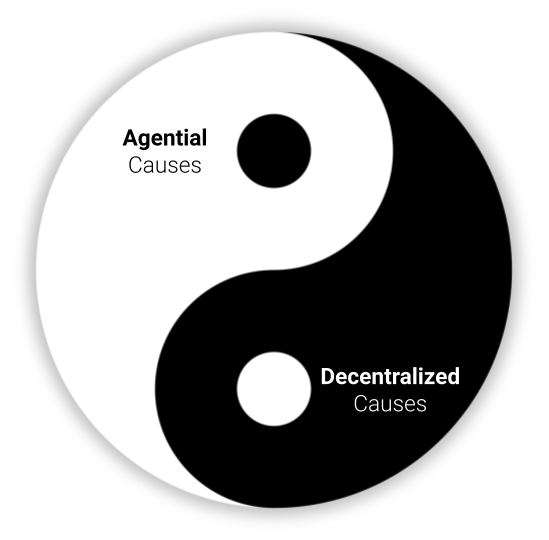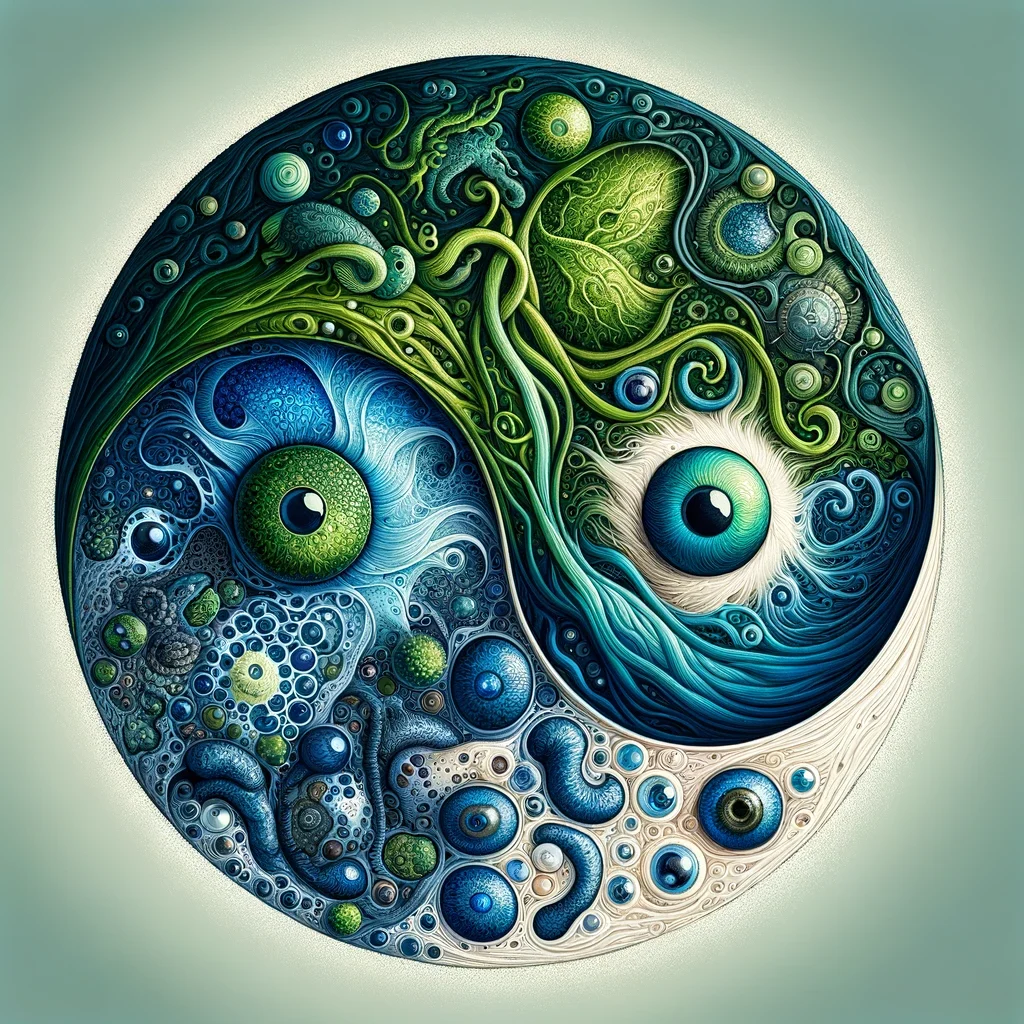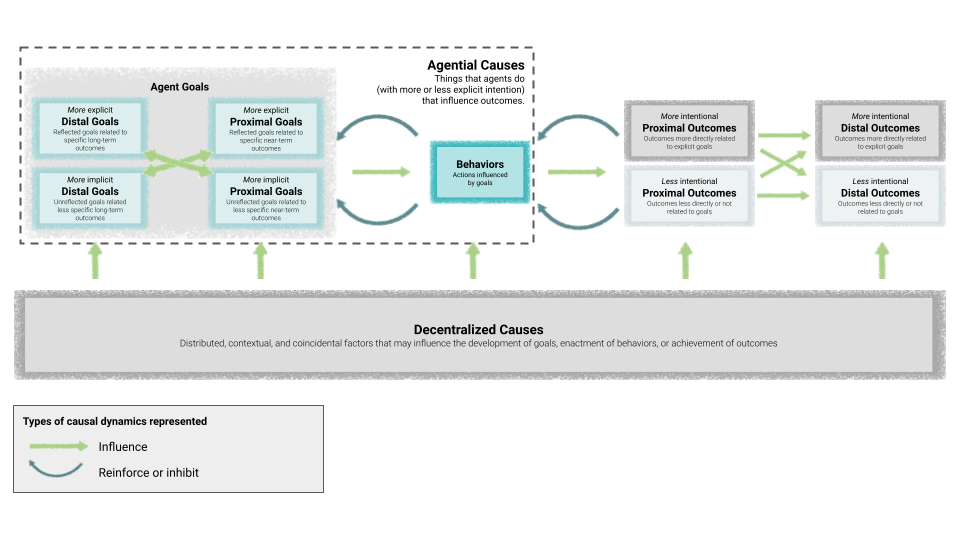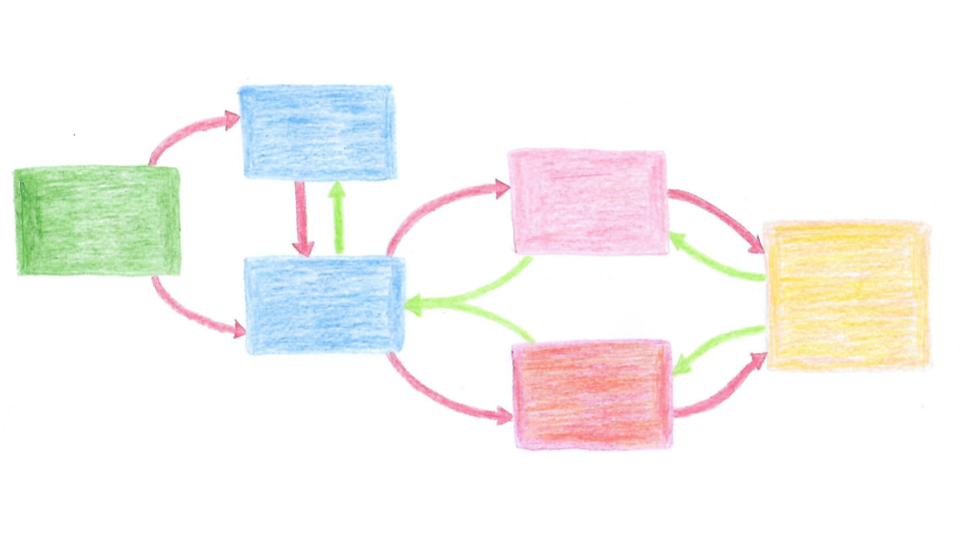The Decentralized Self
Some humans may intuitively think that our brain, or perhaps our body as a whole, is the seat of human agency. Critically, however, this agency is caused by cellular agents unaware of our larger human goals.
Thus, an apparent paradox of scientific self-understanding is that to reason about what it means to be a self is to understand that each of us is emergent from networks of decentralized causes, causes largely unrelated to our own goals.
How we come to understand and reason about the seemingly oppositional concepts of agency and decentralized causation represents an important facet of our self and scientific understanding of the world.
For these reasons, it can be helpful to develop your own conception of the decentralized self.
Integrating our understanding of agency and other causes

As a visual metaphor, we suggest the concept of Yin and Yang from Chinese philosophy provides a helpful heuristic for describing the nested and interdependent nature of agential and decentralized causes. Understanding these relationships explicitly can allow for a more integrated form of causal reasoning across domains of biology, cognition, culture, and computation.
Agential and decentralized causes are, in some ways, conceptual opposites, with decentralized causes being defined, in part, by a lack of a central agent in control.
However, because of the complex, multilevel structure of living and socio-cultural systems, any verbal description of agential or decentralized causation may include elements of the other. For example, the human brain (and our body as a whole) is the seat of human agency, and yet the brain itself exhibits highly decentralized dynamics among neurons and neural networks, which themselves may be conceptualized as having (limited) forms of biological agency, emergent from still further decentralized processes.
The key to scientific analysis is to adequately model the cognitive-behavioral capacities of agents as (only sometimes partially intentional) influencers of change and adaptation within a multilevel complex of otherwise decentralized systems dynamics.
Metaphors and Models of the Decentralized Self
Metaphors and analogies can often help us expand our thinking by leveraging the familar to understand the unfamiliar.
To understand scientific conceptions of the decentralized self, we are collecting historical and modern metaphors or conceptual models informed by scientific theories, that may help illuminate the nature of this counter-intuitive concept. In part, we see this as continuing a discussion perhaps most explicitly started by Mitchel Resnick’s (1996) paper, Beyond the Centralized Mindset.
Importantly, some of these concepts go beyond ‘mere metaphor’ and actually reflect the communication of scientific models, capable of informing and being revised in the light of continued research. As with all analogies on OpenEvo, the value for you depends on the mapping of specific dimensions between the domains, and this will depend on your aims and questions.
Each example below relates to a much larger literature than can be covered here. Selected references relevant to each metaphor or model are offered at the bottom of this page.
Understanding the concept of collective intelligence offers one lens for understanding the decentralized self, as all intelligence may be viewed as a form of collective intelligence (see Falandays et al. 2022). From slime molds and ant colonies, to the human brain, culture, and even evolutionary processes, all can be seen as instances of intelligent problem solving that are emergent from the simple agent behaviors at the lower level of organization (note that this does not at all imply that evolution is a process of “Intelligent Design”, it is not). Understanding the decentralized origins of diverse intelligences around the world provides a rich set of examples to build an intuitive understanding of your own decentralized self.
The metaphor of the body as a multicellular ‘political state’ has a long history across cultures, and was the subject of scientific discourse, particularly in the late 19th and early 20th century rise of biological sciences (see Reynolds 2008). The metaphor draws on human reasoning about the collective agency of human societies to attenuate our understandings of the biological regulation among cellular ‘constituents‘ within an organism. The metaphor invites challenging questions regarding ‘who’, if anyone, is in charge? What kind of ‘governance system’ is a biological organism? The cell state metaphor is one that breaks down rather quickly, but in doing so, may guide us to a more intuitive understanding of the massively decentralized and flexibly coordinated regulatory dynamics of evolving biological systems.
“It’s a jungle in there!” according to the cognitive scientist David Rosenbaum (2014). Drawing on diverse traditions in psychology, neurobiology, and cognitive sciences, Rosenbaum highlights how the analogy of an evolving ecosystem can help illuminate the decentralized causal dynamics of our brains and minds. As neural networks cooperate and compete for the limited renewable resources of our brain, our mind (the information processing capacities of our brain) becomes better adapted to some aspects of the environment.
If the jungle metaphor is a bit too wild for you, perhaps a garden is more your style. The garden has long been a metaphor for the interaction of agency and decentralized causes within self and society (e.g. see Liu & Hannauer 2011). Seeding and weeding, adapting to seasonal change and sudden shifts of day-to-day weather all provide rich fodder for understanding the complex historical contingencies and causal interdependencies among elements within ourselves and our societies.
The human brain is a like a society managing common-pool resources, with populations of neurons and neural networks cooperating and competing for limited computational resources.
The human brain is a biological organ, fully dependent on the limited renewable resources afforded to it by the body. The brain is also a population in its own right, a vast ‘society’ of cells that, collectively, influence the behaviors of the human they are in (see e.g. Minsky 1988, Edelman 1993, Rosenbaum 2014, Dennett 2017).
The complex systems dynamics that emerge because our brain is a population of cells cooperating and competing for resources represent a unique nexus for interdisciplinary learning.
see also: Internal Family Systems (Schwartz & Sweezy 2019)
Research and perspectives on the neurocognition of religious and mystical-type experiences across cultures and contexts suggest that a common underlying pattern of cultural cognition may help unify our understanding of these unique dimensions of human experiencing (McNamara 2022). This process of decentering involves a shift from the view of self-as-agent, to grappling with the experience of a decentralized self, and finally a re-integration with the self-as-agent within a broader context of social bonds or personal meaning.
Critically, decentering may occur in a vast space of experiential valence (from stronger mystical-type experiences to more everyday meditations on self-understanding). Thus, creating cultural technologies (e.g. therapies and educational curricula) that enable greater contextual control over this agential-decentralized space of experience may be possible and, perhaps, desirable.
Many cross-cultural and scientific perspectives have converged on the insight that every human individual is (and indeed, all multicellular organisms are), simultaneously, a population, of cells, and selves (Fadiman & Gruber 2020). Our multiple selves are intuitively revealed in our everyday language as when one might say something like “I wasn’t my self last night”, or “Part of me wanted to go the party, but part of me just wanted to stay home”. From a scientific perspective, the unified sense of self is emergent from a diversity of processes that may be variously coordinated or not.
Mental health and well-being is tightly correlated, albeit in complex ways, with our capacities to reason about, and work cooperatively with, our multiple selves.
The human capacity for decentering, and the scientific foundations for conceptualizing individuals as populations or multiple selves, has led some to suggest or describe the self as an ‘illusion’ (see Hood 2012).
A metaphor to economic currency may be helpful in this realm. Money is a ‘real’ phenomenon, however, absent a cultural narrative, money is also a collective fiction we agree to abide by, money has no ‘real’ value beyond what we agree to perceive it to have. Money, in this sense, is an ‘illusion’ we agree to for the functioning of society.
In this way, it can be argued that the self, our understanding of ourselves as individuals, is a constructed illusion, for the purposes of functioning within societies.
If the view that the self is an illusion sounds too strange, or perhaps too disconcerting, perhaps it may be helpful to think about yourself as “context”. The concept of Self-as-Context is a core principle within the tradition of Contextual Behavioral Science and the practice of Acceptance and Commitment Therapy (ACT) (see Hayes et al. 2020, Godbee & Kangas 2020).
Self-as-context suggests viewing oneself not as the content of our thoughts and feelings, but as a conscious experience of those populations of thoughts and feelings, as a system of interacting parts evolving in relation to the broader environment, and capable of flexible adaptation under certain conditions that we can work to cultivate. Adopting the self-as-context view may help promote cognitive defusion, or the non-attached experiencing of difficult thoughts and feelings. This cognitive defusion may further help develop psychological flexibility, the capacity to persist or change behaviors in relation to valued ways of living. Thus, adopting a self-as-context view is associated with a range of mental and physical health outcomes.
Human societies function as collective brains, with individuals in social networks cooperating and competing to drive adaptive innovations, much like neurons within neural networks.
This analogy may contradict our intuitive ways of thinking about the origins of human cultural innovations.
Throughout history and common to the folk psychologies of many modern cultures, humans sometimes don’t see all the complex, contextual, incremental, coincidental, and otherwise, non-agential processes that may contribute to the successful innovation of an individual or community. That is, folk narratives often engage the “myth of the heroic inventor”; ascribing capacities more akin to Gods, Genies, or Geniuses, than of average humans, in the creation of some novelty or cultural success. What can we learn from the analogy of the collective brain?
For a deeper look, watch this video with Dr. Michael Muthukrishna.
Learning and evolution are both concepts for processes of adaptive change. However, learning and evolution may be variously conceptualized by different experts as either fundamentally different in nature, or as having significant conceptual commonalities (while also exhibiting clear differences).
For those who emphasize the fundamental differences between these concepts, learning may be viewed as a more purposeful, goal-directed process occurring within the lifetime of individuals, with evolution being viewed as a purposeless, undirected process occurring within populations over generations of individuals. We feel this perspective offers an overly narrow view of both learning and evolution.
For us, and many others across the history of science, both learning and evolution can be understood to involve adaptation driven by agency-independent contextual factors (i.e. ‘mindless’ or ‘purposeless’ causal factors such as environmental conditions), as well as influences from the agency of an individual or external agent (i.e. the goals and purposes of agents in the environment; see also, our thinking tool: The Triad).
If the view of an individual-as-population is adopted, then learning can be conceptualized as a process of intra-indiviudal evolution among the relationships between entities within the ecosystem of the self (e.g. a change in the strength and structure of neural networks or conceptual networks).
See more on our Learning:Evolution Analogy page within the Understanding Agency project.
More generally, understanding the decentralized self requires reflection on four core perspectives regarding the organization of ourselves as indivduals composed of cellular populations, interacting within networks of social groups.
1) Self-as-Agent
First, we can easily recognize our intuitive mode of self-understanding: a view that we are individual agents with goals and behaviors. Our everyday life is filled with the experience of pursuing goals, big and small, individual, and social. This is a core cognitive skill of humans around the world.
2) Self-as-System
After understanding Self-as-Agent, we can develop our understanding of the many decentralized causes among the lower-level agents (cells and organs) that we are composed of, as well as being a part of many higher level social groups. Here we can develop an intuitive understanding of ourselves as decentralized systems.
3) Group-as-Agent
In reflecting on the dual reality of the self as simultaneously an agent and a decentralized system, we can transfer our learning to critically reflect on how our social groups can function as agents – with humans as like neurons in a collective brain. Not all groups function so much like agents, and so this perspective demands us to ask how group structures relate to lower-level agent behaviors, in terms of the alignment of goals, behaviors, and outcomes.
4) Groups-as-Systems
Finally, in recognizing the capacity of groups to function as like agents, we can reason more deeply about the many levels of agency and decentralization among the interdependent causal factors that drive our evolving biological and social organizations within the many complex adaptive systems of our world.
In fact, these four perspectives are really just the critical reflection of agential and decentralized causes across multiple levels of organization in biology and society. For practical and scientific understanding of ourselves and our societies, humans often need to flexibly switch between, and integrate among, these perspectives. This can allow us to hone our intuitions and reflective capacities to draw on our deeper mental models of agential and decentralized causes in ways that serve our goals and values in relation to whatever challenges we are trying to think through.
In this way, developing a generalized schema or mental model of The Decentralized Self is a foundation for developing scientific and practical perspectives on a wide range of topics across the biological and social world.
Other tools for Understanding Agency
Deepen your understanding of agency across diverse contexts through other resources in the collection.

Understanding Agency
Tools for thinking about the origins, diversity, and flexibility of goal-directed behaviors

Goals, Behaviors, and Outcomes
How can we understand the causal relationships between goals, behaviors, and outcomes?

Agency in Evolution Education
A page for researchers interested in the concept of agency as it relates to learning theories of evolution, including natural selection in biological systems.
References and further resources
The concept of the decentralized self includes themes pervasive across disciplines and cultural traditions. This page is a developing resource and is not close to comprehensive in scope. Below are references used to inform the summary above, and further resources that may help you develop a more interdisciplinary perspective on this foundational concept.
Bernstein A, Hadash Y, Lichtash Y, Tanay G, Shepherd K, Fresco DM. Decentering and Related Constructs: A Critical Review and Metacognitive Processes Model. Perspect Psychol Sci. 2015 Sep;10(5):599-617. doi: 10.1177/1745691615594577. PMID: 26385999; PMCID: PMC5103165. https://www.ncbi.nlm.nih.gov/pmc/articles/PMC5103165/
Bernstein, A., Hadash, Y., & Fresco, D. M. (2018, December 6). Metacognitive Processes Model of Decentering: Emerging Methods and Insights. https://doi.org/10.31231/osf.io/zkjeb
Cooper, R. A. (2017). Natural selection as an emergent process: instructional implications. Journal of Biological Education, 51(3), 247-260.
Dennett, D. C. (2017). From bacteria to Bach and back: The evolution of minds. WW Norton & Company.
Edelman, G. M. (1993). Neural Darwinism: selection and reentrant signaling in higher brain function. Neuron, 10(2), 115-125.
Edwardes, M. P. (2019). The origins of self: an anthropological perspective (p. 248). UCL Press.
Fadiman, J., & Gruber, J. (2020). Your Symphony of Selves: Discover and Understand More of Who We Are. Simon and Schuster.
Falandays, J. B., Kaaronen, R. O., Moser, C. J., Rorot, W., Tan, J., Varma, V., … Youngblood, M. (2022, December 2). All Intelligence is Collective Intelligence. https://doi.org/10.31234/osf.io/jhrp6
Godbee, M., & Kangas, M. (2020). The relationship between flexible perspective taking and emotional well-being: A systematic review of the “self-as-context” component of acceptance and commitment therapy. Behavior Therapy, 51(6), 917-932.
Goldstone, R. L., & Wilensky, U. (2008). Promoting transfer by grounding complex systems principles. The Journal of the Learning Sciences, 17(4), 465-516.
Grotzer, T. A., Derbiszewska, K., & Solis, S. L. (2017). Leveraging fourth and sixth graders’ experiences to reveal understanding of the forms and features of distributed causality. Cognition and Instruction, 35(1), 55-87.
Hood, B. (2012). The Self Illusion: Why there is no ‘you’ inside your head. Hachette UK.
Liu, E., & Hanauer, N. (2011). The gardens of democracy: A new American story of citizenship, the economy, and the role of government. Sasquatch Books.
McHugh, L. (2015). A contextual behavioural science approach to the self and perspective taking. Current Opinion in Psychology, 2, 6-10.
Hayes, S. C., Hofmann, S. G., & Ciarrochi, J. (2020). A process-based approach to psychological diagnosis and treatment: The conceptual and treatment utility of an extended evolutionary meta model. Clinical psychology review, 82, 101908.
McNamara, P. (2022). The Cognitive Neuroscience of Religious Experience: Decentering and the Self. Cambridge University Press.
Minsky, M. (1988). Society of mind. Simon and Schuster.
Muthukrishna, M., & Henrich, J. (2016). Innovation in the collective brain. Philosophical Transactions of the Royal Society B: Biological Sciences, 371(1690), 20150192.
Petrosino, A. J., Lucero, M. M., & Mann, M. J. (2015). Decentralized thinking and understanding of evolution in K-12 evolution education. Evolution: Education and Outreach, 8(1), 1-12.
Resnick, M. (1996). Beyond the centralized mindset. The journal of the learning sciences, 5(1), 1-22.
Resnick, M. (1999). Decentralized modeling and decentralized thinking. In Modeling and simulation in science and mathematics education (pp. 114-137). New York, NY: Springer New York.
Reynolds, A. (2008). Ernst Haeckel and the theory of the cell state: Remarks on the history of a bio-political metaphor. History of Science, 46(2), 123-152.
Rosenbaum, D. A. (2014). It’s a jungle in there: How competition and cooperation in the brain shape the mind. Oxford University Press.
Schwartz, R. C., & Sweezy, M. (2019). Internal family systems therapy. Guilford Publications.
Watson, R. A., Levin, M., & Buckley, C. L. (2022). Design for an individual: connectionist approaches to the evolutionary transitions in individuality. Frontiers in Ecology and Evolution, 64.
About the Understanding Agency collection
This evolving collection of concepts, tools, and resources is being developed to support diverse learners around the world in strengthening your own conceptual understanding of the intelligent agents that pervade our world. It is the result of a synthesis based on our OpenEvo Educational Design Concept, combined with scientific inspiration from the Diverse Intelligences Summer Institute.
We welcome collaborations with students, teachers, and researchers interested in advancing the educational potential of understanding agency. Contact us with questions.

